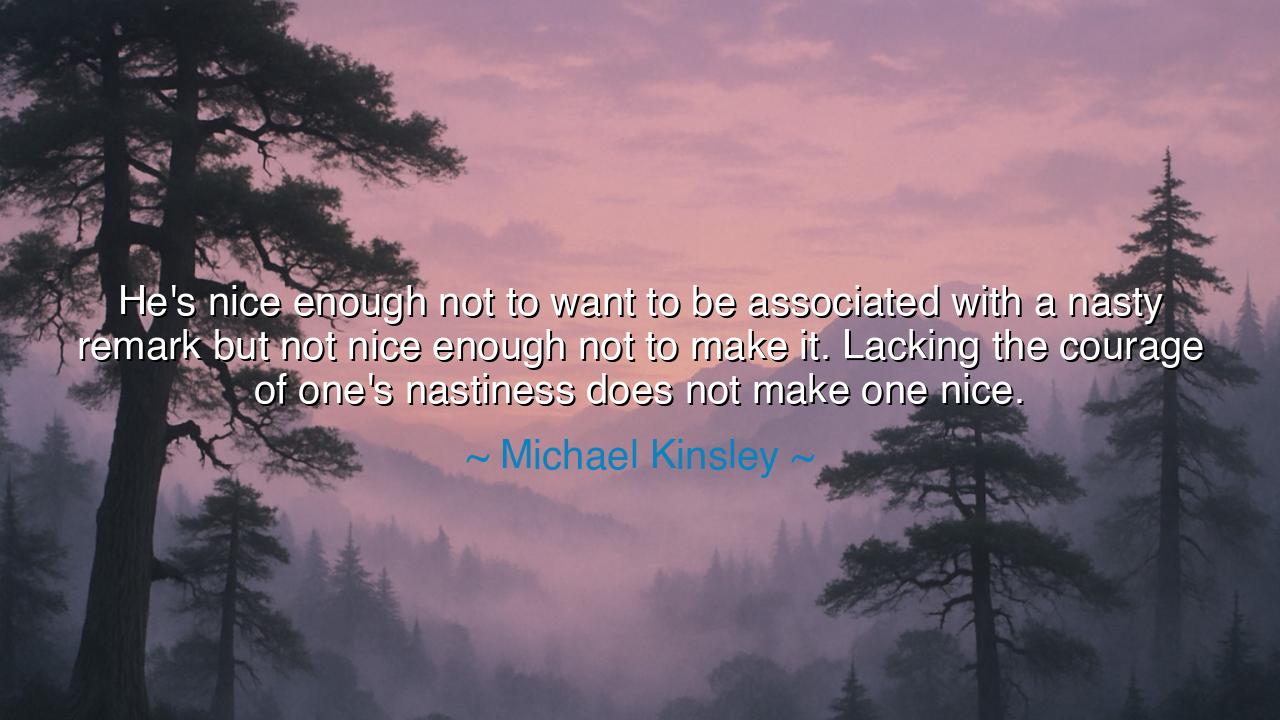
He's nice enough not to want to be associated with a nasty remark
He's nice enough not to want to be associated with a nasty remark but not nice enough not to make it. Lacking the courage of one's nastiness does not make one nice.






“He’s nice enough not to want to be associated with a nasty remark but not nice enough not to make it. Lacking the courage of one’s nastiness does not make one nice.” – Michael Kinsley
In this sharp and penetrating observation, Michael Kinsley, the journalist and commentator known for his wit and moral clarity, unmasks one of the great hypocrisies of human character — the pretense of goodness without the substance of it. His words cut to the heart of a timeless truth: that kindness without honesty is only disguise, and that to appear virtuous while harboring cruelty is a deeper vice than cruelty itself. The one who hides behind politeness, making nasty remarks cloaked in humor or deflection, deceives not only others but his own soul. Kinsley reminds us that virtue is not measured by the appearance of civility, but by the courage to live with integrity — to speak truthfully, to act cleanly, and to own the darkness within rather than disguise it.
The origin of this truth lies not only in Kinsley’s world of political and intellectual debate, but in the very fabric of human society. Throughout history, there have been men and women who have clothed their malice in gentility — the smiling betrayers, the soft-tongued liars, the courtiers of deceit. Such people are not openly wicked, for open wickedness requires a kind of courage; instead, they wound from the shadows, preferring to let their barbs pierce unseen. They seek to appear “nice,” to be thought fair and good, while spreading venom in whispers. But as Kinsley teaches, to lack the courage of one’s nastiness does not make one nice — it only adds cowardice to cruelty.
The ancients themselves knew this truth well. The philosopher Aristotle warned that virtue is destroyed not only by excess but by disguise — that hypocrisy, the pretense of goodness, is among the most insidious forms of vice. Better, he said, to be honestly flawed than to hide corruption beneath a smile. Consider the words of Julius Caesar, betrayed by his closest ally, Brutus. “Et tu, Brute?” he cried — not because his enemy struck him, but because his friend did. The dagger of a declared foe wounds the body, but the betrayal of a false friend wounds the soul. The act of hiding one’s cruelty behind courtesy is an ancient and cowardly sin, for it corrupts not only the act, but the very essence of truth.
To understand Kinsley’s meaning in our time, we must recognize how this false niceness lives among us — in polite gossip, in veiled insults, in those who speak cruelty and then soften it with laughter or pretense. “Oh, I didn’t mean it that way,” they say, or “I’m just being honest,” though their honesty is nothing but a weapon sharpened by envy or pride. Such people seek the comfort of appearing moral while enjoying the satisfaction of being cruel. But as Kinsley reminds us, niceness without moral courage is an illusion; it is not goodness, but cowardice in pleasant clothing.
True kindness requires strength. It demands the courage to confront one’s darker impulses — to feel anger, jealousy, or contempt, and yet choose not to give them voice. It is not enough to hide nastiness; one must rise above it. The noble soul does not pretend to be pure, but labors daily to purify itself. And if one must speak a harsh truth, let it be spoken openly, with purpose and compassion, not hidden beneath the coward’s veil of “niceness.” There is honor in candor, even when it wounds, but there is none in deceit dressed as charm.
Consider, for example, the statesman Abraham Lincoln, who often faced bitter ridicule and personal attack. He was known for his gentleness, but his gentleness was born of strength, not fear. When insulted, he did not respond with false civility or veiled cruelty; he responded with patience, humor, and truth. His kindness did not make him weak, and his honesty did not make him cruel. He possessed what Kinsley’s words point toward — the courage to be kind, the bravery to let his words and deeds align. Such integrity creates not the illusion of goodness, but the reality of it.
Therefore, my children, take this teaching as a mirror for your own hearts. Do not strive merely to appear “nice,” for niceness can be hollow — a mask that hides pride, envy, or fear. Instead, strive to be good, which is far harder and far nobler. Be honest in your speech, merciful in your judgment, and courageous in your truth. If a remark is cruel, do not make it; if a truth must be spoken, speak it with compassion. For to be gentle without honesty is weakness, but to be honest without compassion is brutality. The true path of virtue lies between them — in the union of courage and kindness, of truth and grace.
And remember always the wisdom of Michael Kinsley: to lack the courage of one’s nastiness does not make one nice. The coward may hide his malice, but the wise transform it. The noble soul does not disguise its flaws; it conquers them. So let your words be pure, your heart be brave, and your goodness be real — not the performance of virtue, but the living truth of it. For in that truth lies not the comfort of being “nice,” but the eternal strength of being good.






AAdministratorAdministrator
Welcome, honored guests. Please leave a comment, we will respond soon